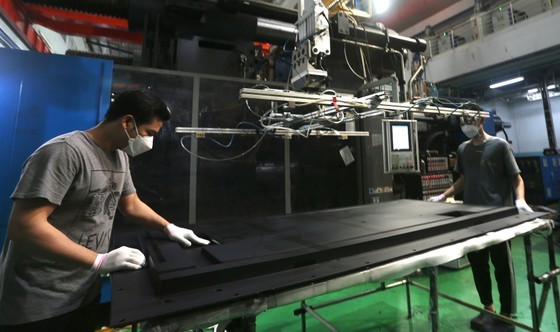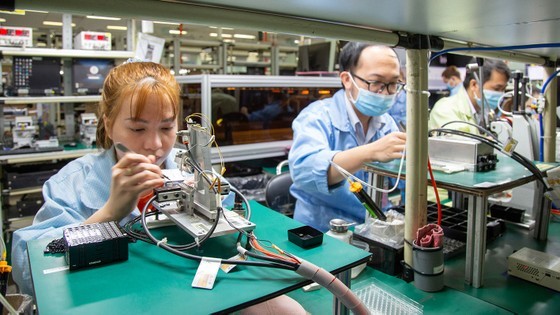 |
HCMC needs new industrial development strategies |
According to the Ho Chi Minh City Department of Industry and Trade, the city's industrial production index has grown by just over 1.4 percent since the beginning of the year. In which, four key industries including electronics, chemicals and pharmaceuticals, food and beverage, and mechanical engineering have had a record low growth rate over the past 20 years.
Specifically, the food and food industry decreased by 0.8 percent, followed by electronics with a decrease of 0.6 percent. Particularly, the chemical and pharmaceutical industry and the mechanical industry still maintained a slight increase of 12.6 percent and 4.3 percent respectively.
Talking about the above issue, deputy director of the Ho Chi Minh City Development Research Institute Truong Minh Huy Vu said that one of the barriers to the city's industrial development is the limitations of resources, especially land resources, to attract large-scale investment projects.
Currently, the city has only 17 industrial parks (IPs) in an area of 4,549ha out of a total of 23 planned industrial zones. Meanwhile the Southern key economic region has 118 industrial zones with more than 52,000 hectares and the country has 288 industrial zones with 123,000 hectares.
More worryingly, the city is facing many restrictions on new land funds to develop more industrial zones and is in danger of having to take out the previously planned IPs from the planning.
Mr. Tran Vinh Ha, Chairman of Vinh Phat Motors Company said that lack of land funds is not the city’s biggest problem but the policy on industrial park land which has not really motivated businesses to lease land is the main problem.
 |
Electronic equipment production line at Datalogic Company in Saigon Hi-Tech Park. (Photo: SGGP) |
Enterprises leasing land from industrial park investors pay one-time rent, but it is an annual payment on record. Thus, credit institutions don’t accept collateral to lend to businesses. Besides, IP investors enjoy the preferential policies of the State such as deferred payment, exemption and reduction of land rent instead of enterprises renting land in the IPs. Businesses have made petitions for consideration of this problem for many years, but so far it has not been resolved.
In fact, Ho Chi Minh City's new investment attraction has plummeted by more than 80 percent in the first 4 months of 2023 against the same period last year. In addition, for many years, the city has had the policy to limit the attraction of labor-intensive investments and encourage active businesses to transform production towards high technology. This process also reduces a large number of businesses that are not able to diversify their production towards more technologically advanced types and as a result, they have to relocate to neighboring areas.
According to Mr. Tran Vinh Ha, first of all, the city needs to set up new industrial parks with an available clean land fund. Along with that, it is necessary to define a strategy to attract specialized investment for each IP, to draw lessons from the experience of attracting general investment like the current IPs because it is difficult to create a specialized production chain with high competitiveness.
Responsible ministries and agencies are necessary to propose a removal of the inadequacies of the Land Law's policies, especially the policy of leasing industrial land and granting land lease certificates to help businesses optimize capital for production. Moreover, competent agencies should help businesses during production transformation by applying digital transformation and creating a digital transformation center that can directly support enterprises so that businesses can save time and money.
Furthermore, the government should give financial support to businesses. In addition to issuing support packages, the authorities need to change the way they manage and operate smoothly.
Mr. Nguyen Ngoc Hoa, Chairman of the Ho Chi Minh City Business Association, moaned the investment stimulus program is chaired by the municipal People's Committee and the State Financial Investment Company of Ho Chi Minh City to deploy capital support for key industries with preferential interest rate up to 7 years. The program has been implemented for many years but was suddenly stopped in 2021, causing many businesses to break their investment plans and face the risk of bankruptcy.
Meanwhile, Roland Berger Group - one of the world's leading strategic research organizations - pointed out that Ho Chi Minh City currently has a lot of room and is experiencing clear development shifts in a number of high-value-added sectors.
Therefore, along with the current key industries, Roland Berger Group suggested Ho Chi Minh City expand to new industries such as biotechnology, medical equipment, robotics automation, new materials and renewable energy equipment. At the same time, the city should create an ecosystem of potential industry-supporting service industries including tourism, finance, insurance, investment banking, e-commerce, high-quality healthcare, transportation and logistics, and educational technology.
According to Roland Berger Group director Bui Dao Thai Truong, Ho Chi Minh City needs to outline a two-step roadmap including acceleration of the restructuring of existing industries in order to improve production by using technologies and relocation of polluting establishments so that the city has more land for the development of new industries.
He also said that the city should create an ecosystem, and utilize and promote regional linkages to attract high-tech industries step by step.
























